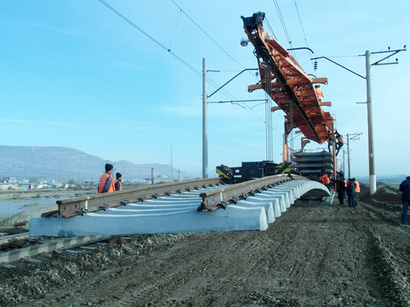
Russia May Gain in South Caucasus, as Georgian Government Wavers on Regional Railway Projects
Publication: Eurasia Daily Monitor Volume: 10 Issue: 18
By:

On December 21, 2012, Georgian Prime-Minister Bidzina Ivanishvili dropped a bombshell, stating that ongoing construction of the Baku-Tbilisi-Kars (BTK) railway, connecting Azerbaijan to northeastern Turkey via Georgia, raised many questions about its economic efficiency and profitability for Georgia, regardless of the project’s geopolitical importance (www.geopalitratv.ge, December 22, 2012). The statement was widely considered as a threat to the continuation of this politically and economically important project, which has been under construction since 2007 and already cost hundreds of millions of dollars. It caused an uproar in Georgia (www.interpressnews.ge, December 21, 2012) and especially in Azerbaijan, where some even suggested that Baku might think about raising its price on natural gas for Georgia (www.regnum.ru, December 23, 2012; www.presa.ge, December 26, 2012).
The BTK railway project envisages the construction of a roughly 65-mile railway link between the city of Kars in northeastern Turkey and the city of Akhalkalaki, in southern Georgia. Furthermore, it includes plans for the rehabilitation of the existing railway link within Georgia between Akhalkalaki and the town of Marabda, in the southeastern corner of the country, close to the Azerbaijani border. From there it will link up with the railway line running through Azerbaijan all the way to its capital Baku on the Caspian Sea. The 516-mile-long railway, which will cost around $600 million, eventually will have the capacity to annually transport over 15 million tons of freight and 3 million passengers. The project will be completed in 2013.
Of tremendous geopolitical and economic importance for Georgia, the BTK railway will link the country to Europe by the direct transport corridor through Turkey, bypassing Russia. The project also helps Georgia, economically and politically, to more closely integrate the Armenian-populated Georgian region of Javakheti, through which the railway will pass. In addition, the railroad link enhances more integrated economic and political relations among Azerbaijan, Georgia, and Turkey. Besides connecting Azerbaijan to Turkey, the project also has the potential to link Central Asia and other areas of Central Eurasia to Europe. Hosting this important railway undoubtedly increases Georgia’s geopolitical weight in the Caucasus region and beyond. Its importance is hard to underestimate.
In this light, Prime Minister Ivanishvili’s statement initially appears confusing. Many attributed it to his poor communication skills. Others, among them Ivanishvili’s supporters, however, saw in this statement a calculated and shrewd diplomatic step in the run-up to Ivanishvili’s visit to Azerbaijan in order to secure some concessions from Baku (www.iveroni.com.ge, December 21, 2012). Nevertheless, it remains unclear what exactly Ivanishvili intended to achieve and what he actually attained in Baku by this statement.
The whole affair became even more confusing when several days later, during his official visit in Azerbaijan, Ivanishvili stated that he probably made hasty and politically flawed remarks, and all the questions now were answered and removed (www.georgiatoday.ge, December 27, 2012); hence, construction of the BTK project faced no threat (www.civil.ge, December 24, 2012).
Ivanishvili’s statement will make clear sense only after taking a brief look at the geopolitical controversies surrounding the project. The project was (and is) opposed by Russia and its ally in the South Caucasus, Armenia. Moscow sees the BTK railway (and correctly so) as a potential competitor to Russia’s Trans-Siberian railway, which carries freight from China and Central Asia to Europe. Also, Moscow considers the project a threat to its influence in the South Caucasus as the railway, directly connecting Azerbaijan, Georgia and Turkey, increases the political and economic integration of these three countries. The BTK railway also can further diminish the regional importance of the Armenian South Caucasus Railway line, currently owned by Russia.
Armenia also fiercely opposed the BTK project, which increases the country’s economic as well as political isolation. Yerevan has instead lobbied for the reopening of the Kars-Gyumri-Tbilisi (KGT) railroad, running from Turkey through Armenia to Georgia and on to Azerbaijan. However, Baku has strongly opposed the reopening of the KGT line as it tries to isolate its adversary, Armenia. The KGT railway was closed in 1993 by Turkey, in solidarity with Azerbaijan during the Armenian-Azerbaijani War (1988–1994) over Karabakh.
Armenia, using its powerful ethnic lobby in the US, actually succeeded in 2005–2006, through the United States Congress and acting US administration, to block the Export-Import Bank from funding the BTK railway project. However, Baku, being greatly interested and fully realizing the strategic importance of the project for Azerbaijan, stepped in, loaning Georgia $220 million for the project at a low one-percent annual interest rate, repayable over 25 years (see EDM, January 19, 2007).
Against the background of this geopolitical strife and alignment around the BTK project, Ivanishvili, who is gradually shifting Georgia’s foreign policy orientation toward Russia and courts its close ally Armenia, by his statement arguably attacked the project either voluntarily (to please Moscow and Yerevan) or as a result of applied pressure (from Moscow and Yerevan).
In a related development, on January 17, Ivanishvili declared that Georgia is fully ready to reopen the country’s railway link to Russia via breakaway Abkhazia (www.iveroni.com.ge, January 18). The transport link also connects Russia to Armenia. This statement came as a surprise, since Tbilisi declared this topic closed back in November, as a result of the lack of interest from the Abkhazian side (www.commersant.ge, November 28, 2012). But in another surprise development, the Abkhazian separatist regime’s leader, Alexander Ankvab, quickly followed Ivanishvili’s statement, stating that Abkhazia was ready to discuss the issue if approached (www.frontnews.ge, January 18). It is highly unlikely that Sukhumi made this statement independently without consulting Moscow first. It is also unlikely that Abkhazia’s separatist regime, which initially did not express any interest in reopening the railway link, changed its position without Moscow’s pressure.
Taking the two above-mentioned developments together, it becomes clear that Moscow seeks first, to torpedo the Baku-Tbilisi-Kars project; and second, to reopen the railway connecting Russia to its ally Armenia. Moscow will be the top regional winner if it succeeds in both. As the Georgian government vacillates, Russia seems poised to succeed in at least one of the two goals, which will definitely strengthen the Kremlin’s position in the South Caucasus.




